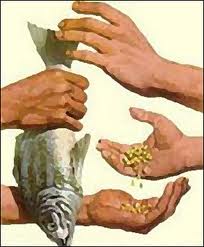Cursed, Part 2--The Case Against GMOs
It turns out that these “rice farmers” weren't actually what they say they were; they were actually misguided
activists who moronically believe that food crops that carry the tag “GM”
(genetically modified) are automatically bad.
The rice plants that were destroyed
were “endowed with a gene from cornand another from a bacterium, making it the only variety in existence toproduce beta carotene, the source of vitamin A. Its developers call it “Golden Rice.” If made available to people, a cup of this rice variety would provide
half an adult’s daily recommended intake of Vitamin A.
Vitamin A
deficiency causes the death of millions of people around the world, and could
also cause blindness among children.
The
vandals were members of the Kilusang Magbubukid ng Pilipinas (KMP), AnakPawis
Party list, and MASIPAG, organizations that ironically style themselves as
pro-farmer and pro-poor.
They were
there to stage a protest versus GMOs, a protest that quickly turned into an
orgy of rice plant-killing when a group broke away and destroyed the rice
plants in the trial fields, to the consternation of the real farmers who
witnessed the attack.
GMOs (genetically modified organisms) have always been a target
for these “environmentalists,” who think that we should all return to “traditional”
or “organic” agriculture. However, isn't agriculture itself always been unnatural? Since Homo sapiens found a
more efficient alternative to the hunter-gatherer lifestyle around 10,000 years
ago, humans have been genetically-altering most food crops.
Take for example the banana. The “natural” form of the banana is vastly
different from the banana that we enjoy today. The “genetically unmodified”
banana was a tasteless, mushy fruit with large seeds, and shaped differently
from the modern banana. Rice, wheat, corn, are
food crops similarly far removed from their wild
ancestors. Do these food crops cause illnesses?
Genetic modification,
basically, is a shortcut to get the more favorable traits in a crop. Selective
breeding would produce a similar result, but that would take considerably more
time.
Point is, not all genetically-modified foods are harmful; nor are
they made solely for the benefit of multi-national corporations, like the
much-maligned Monsanto.
Genetically modified foods made it possible for a good part of
humanity to exist. If the world would rely solely on “organic foods,” the food production would only be sufficient to feed about 4 billion of the world’s population. Should the rest of humanity be asked to please quietly die from
hunger because there are people who think GM foods are “yucky”?
People like Norman Borlaug (the greatest man you probably never
heard of) made it possible for hundreds of millions, billions even, to have
something to eat. Without this man, many of
us in the Third World would probably never have been born. If people need somebody to worship, idolize, and to emulate, it should be this man.
 |
| "He fed five thousand people? Noob." |
Known as the “Father of the Green Revolution,” Mr Borlaug, who also helped prevent a Malthusian scenario, had a
PhD in plant pathology and genetics. He developed high-yielding and disease resistant
food crops that doubled the food production in many countries around the world,
in the process saving more than a billion people from starvation.
The question of whether this is a good thing for the whole world
in the long run is neither here nor there. That we are alive is sufficient reason for
me to consider this a good thing.
Tons of researches have been done on the safety of GM crops, and the
vast majority of them say that they are safe to eat. Banning GM crops would
mean condemning a good chunk of the world’s population to starvation. Moreover,
GM crops still has the potential to feed many, many more—millions are still
going hungry around the world.
To be fair, some criticisms of genetic modifications may not be
easily dismissed as irrational rants, and these should be addressed by scientists; otherwise, the case versus GMOs would further spiral down into fear-mongering and plain disinformation.
Indeed, the subject of GMOs is an emotional one, and anybody doing
a research on the subject would be swamped by tons of literature that can be found in the
internet, both pros and cons. That's why it is important that we should employ a healthy skepticism in reading about this subject, and not be swayed by slogan-spouting activists-for-hire who are nothing but vandals and thugs.
Many say that because of Green Revolution, population explosion happened, especially in the
Third World; because of this, the resulting increase in the population in this part of the world
is ultimately detrimental for all of us. So basically what they're saying is that for the rest to survive, some of us have to die—by starvation, perhaps? While that
may have some merit (if one thinks about it in a cold-blooded, mass-murderer, and Stalinesque way of thinking), it would be difficult for
them to look for volunteers. I know I wouldn't.
But I might know a few who would be perfect candidates.
But I might know a few who would be perfect candidates.
Additional reading:http://www.skepticalraptor.com/skepticalraptorblog.php/richard-dawkins-talks-gmo-crops/





Comments
Post a Comment
So, what do you think? Post it here: